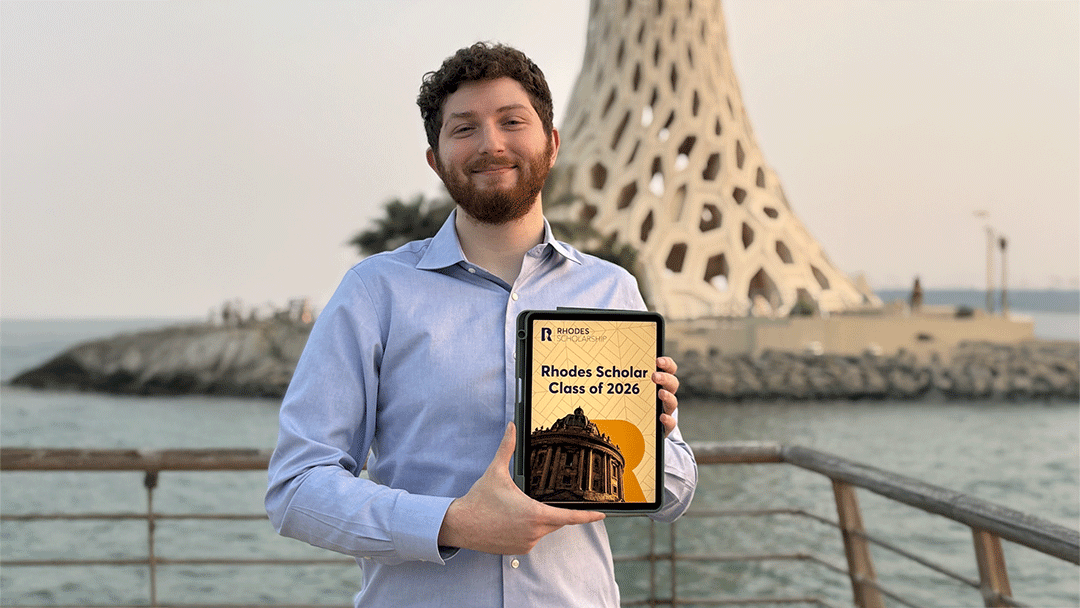KAUST master’s student Osama Dabbousi awarded Rhodes Scholarship

King Abdullah University of Science and Technology (KAUST) master’s student Osama Dabbousi has earned the coveted Rhodes Scholarship — a milestone reflecting KAUST’s growing role in preparing national talent to contribute to Saudi Arabia’s research ambitions and elevating the Kingdom’s global reputation for academic excellence.
“Professionally, the Rhodes Scholarship means that I will become a member of a group of exceptional individuals that I hope to partner with and learn from,” Dabbousi said, adding that the University of Oxford will give him access to research groups and advanced computing resources, broadening the scope of problems he can pursue.
“This will give me the flexibility to explore topics in new domains and deepen the computational research directions I began pursuing here at KAUST.”
Currently studying computer science, Dabbousi’s research involves high-performance computing, focusing on graphics processing unit (GPU)-accelerated, large-scale acoustic simulation — using powerful processors to model how sound moves across large environments such as cities.
He said KAUST has trained him in computational science and provided access to GPU resources, with mentorship from Professor Matteo Parsani, a faculty member in Applied Mathematics and Computational Science.
“That environment helped me develop the depth needed for transformative research, while the many teaching opportunities constantly presented by KAUST allowed me to continue building that skill. My upcoming work at Oxford will build on that foundation by exposing me to new research groups, broader interdisciplinary collaborations, and a global community of scholars.”
Continuing his research at the U.K.’s Oxford in 2026, Dabbousi’s selection highlights the impact of KAUST’s mission-driven approach to developing scientists who can address national priorities in a range of fields, including high-performance computing and interdisciplinary research.
An alumnus of the KAUST Gifted Student Program (KGSP), the University’s flagship scholarship that supports young Saudi scholars through undergraduate study abroad in preparation for graduate research at KAUST, he holds a degree in data science from Boston University.
“It’s no exaggeration to say that KAUST has played an essential role in my academic growth,” he said. Dabbousi emphasized the “wealth of opportunities” that the KGSP provided, as well as the “incredible breadth of courses” and research at KAUST that strengthened his understanding of computer science and helped him mature as a researcher.
Access to KAUST’s cutting-edge facilities, including the Shaheen supercomputer, has also been instrumental to his academic journey, noted Dabbousi. “In the end, I believe that this maturity, and the resulting clarity of my research vision, were some of the deciding factors in my acceptance into Rhodes.”
Long-term, Dabbousi hopes to build a research program in Saudi Arabia that advances high-performance scientific computing and develops computational tools that can support national priorities in science and engineering.
He added: “The two things that have always shaped my future aspirations are a desire to make an impact and a love of teaching and sharing knowledge. With that framing, my time at KAUST and my upcoming work at Oxford are both very important steps in my long-term goal of becoming a professor here in the Kingdom.”
Dabbousi is one of three Saudi students heading to Oxford next year as Rhodes Scholars. The other two, both from King Fahd University of Petroleum and Minerals (KFUPM), are Osama Aljohani, a chemical engineering student, and Omar Alomran, a software engineering graduate specializing in artificial intelligence.
Alomran is a KAUST Academy alumnus, having participated in KAUST’s Introductory and Advanced AI program, which itself included a training component through Oxford.

